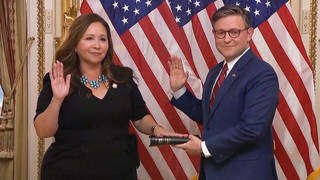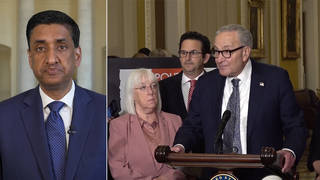
Topics
Condoleezza Rice refused to describe what occurred at the Abu Ghraib prison as torture at her confirmation hearing for Secretary of State. She also claimed the Geneva Conventions does not apply to individuals associated with Al Qaeda. We hear excerpts of the hearing and speak with constitutional lawyer David Cole. [includes rush transcript]
President Bush’s nominee to replace General Colin Powell as Secretary of State, Condoleezza Rice, faced more than 9 1/2 hours of questioning from the members of the Senate Foreign Relations Committee. The opening day of her confirmation hearing went well into the night. When it was over, it was just the committee’s chair, Indiana Republican Richard Lugar, Condi Rice and Senator John Kerry who was making his first major foray back into his role as a Senator since the November election. It was also Illinois Senator Barack Obama’s first major Senate appearance.
Most of the exchanges between Rice and Senators from both political parties were cordial and without many fireworks. There were some moments where Rice faced tough questions on her views on torture and international law, on the administration’s claims about alleged weapons of mass destruction in pre-invasion Iraq and on statements she made about Venezuela and its president Hugo Chavez. The main attack dog for the Democrats was California Senator Barbara Boxer. This was interesting given that California’s other Senator Dianne Feinstein introduced Rice before the questioning began. Boxer also was the Democratic Senator who signed onto the challenge of the electoral college’s certification of President Bush’s victory in the election. In a moment, we are going to hear the first exchange between Boxer and Rice talking about the administration’s justification for the invasion of Iraq, but first this is Boxer questioning Rice about torture.
- Sen. Barbara Boxer (D-CA) questioning Secretary of State nominee Condoleezza Rice about torture, January 18, 2005.
- David Cole, professor at Georgetown Law School and author of the book “Enemy Aliens: Double Standards and Constitutional Freedom in the War on Terrorism.”
Transcript
AMY GOODMAN: In a moment, we will hear the first exchange between Barbara Boxer and Condoleezza Rice talking about the administration’s justification for the invasion of Iraq, but first, this is Senator Boxer questioning Dr. Rice about torture.
SENATOR BARBARA BOXER: You said on July 1, 2004, when you commented on the abuses that took place in Abu Ghraib, and we’re just going to put this up here — you said, what took place at the Abu Ghraib prison does not represent America. Our nation is a compassionate country that believes in freedom. The U.S. Government is deeply sorry for what happened, and so on. You said that about Abu Ghraib. I thought your remarks were very appropriate. Now, last Thursday, we find out that after the Senate unanimously approved an amendment to restrict the use of extreme interrogation measures by American intelligence officers, you wrote a letter along with Mr. Bolten to the members of the Conference Committee asking them to strike that language from the final bill. Unfortunately, that is what they did at your request. Now [Can you bring this over here so I can see it?] I want to read you the operative language that you asked to be struck from the bill that was struck from the bill. “In general” — and by the way, this is written by Joe Lieberman and John McCain. John McCain, a man who knows what torture is. So he wrote this with Joe Lieberman. “In general, no prisoner shall be subject to torture or cruel, inhumane or degrading treatment or punishment that is prohibited by the Constitution, laws or treaties of the United States.” Pretty straightforward, pretty elegant, bipartisan, passed the Senate, that amendment unanimously, every single member. A letter comes, and the newspaper writes that at your request, at the urging of the White House, congressional leaders scrapped a legislative measure last month that would have imposed new restrictions on the use of extreme interrogation measures by American intelligence officers. In a letter to members of Congress, sent in October and made available by the White House on Wednesday this was last week, Condoleezza Rice, the National Security Adviser, expressed opposition to the measure on the grounds that it, quote, “provides legal protections to foreign prisoners to which they are not now entitled under applicable law and policy.” Now, my understanding of this is that is a restatement of what the law is.
CONDOLEEZZA RICE: It was our view in the administration, that first of all this is covered in the Defense Authorization Bill, which the President did sign.
SENATOR BARBARA BOXER: This has to do with the intelligence community, not the military. It’s not covered.
CONDOLEEZZA RICE: Secondly, — but all government agencies were covered in the Defense Authorization.
SENATOR BARBARA BOXER: This was just the intelligence officers. Go ahead.
CONDOLEEZZA RICE: All government agencies were covered in the Defense Authorization, so intelligence was covered.
SENATOR BARBARA BOXER: No it, was not.
CONDOLEEZZA RICE: It’s our view. Secondly, the — we did not want to afford to people who did not — shouldn’t enjoy certain protections, those protections. And the Geneva Conventions should not apply to terrorists like Al Qaeda. They can’t, or you will stretch the meaning of the Geneva Conventions.
AMY GOODMAN: Condoleezza Rice being questioned by Senator Barbara Boxer at Rice’s confirmation hearings as Secretary Of State. We’re joined on the phone by constitutional lawyer, David Cole, professor at Georgetown Law School, author of Enemy Aliens: Double Standards and Constitutional Freedom in the War on Terrorism. Can you explain this letter that Dr. Condoleezza Rice sent, and its significance, David Cole? Welcome.
DAVID COLE: Sure, Amy. I think what has become clear subpoena that in August of 2002, when the Office of Legal Counsel wrote the memorandum that everybody has focused on, that sort of defined away, as much as possible, torture, to free up C.I.A. interrogators to use coercive tactics like waterboarding and the like against individuals, they also issued classified memoranda that specifically authorized tactics like waterboarding to the C.I.A. Those have not been released, but they have been reported on, and essentially, you have a situation in which we have one public, official policy and another secret, unofficial policy. It sounds like Ms. Rice was objecting to this new law because it sought to impose on everybody the standard that we say is our single, official policy. So, essentially what she’s asking is we want to continue with a hypocrisy that says that we’re opposed to torture, but, you know, wink, wink, let’s authorize C.I.A. officials to use tactics that the world understands to be torture because we have defined them as not torture, but cruel, inhuman and degrading treatment and we believe we can do that to people as long as they’re not covered by the Geneva Conventions.
AMY GOODMAN: Well, what about that? She was very straightforward in answering that point. She said that the Geneva Conventions do not apply to members of Al Qaeda.
DAVID COLE: And there’s — there’s actually a decent legal argument that the Geneva Conventions do not apply to members of Al Qaeda, but there’s been decent legal arguments that the Geneva Conventions don’t apply to many of the forces that we have fought in the past, and we have always nonetheless, insisted that we would treat people as if they are protected by the Geneva Conventions. That is, we would not impose torture and cruel, inhuman and degrading treatment on anybody, regardless of whether they fought in an organized military under a state that had signed the Geneva Conventions. So, in Vietnam, for example, there were irregular forces that we were fighting that were not technically covered by the Geneva Conventions. They had not signed on to the Geneva Conventions. They didn’t follow the rules of the Geneva Conventions, but nonetheless, we extended Geneva Convention treatment to them. We have always taken that position until this war, where we have very — you know, very considerably — the administration has decided we don’t want to extend Geneva Conventions to Al Qaeda people and to Taliban people because we want to use coercive interrogation tactics against them. That is precisely what led to the slippery slope that ultimately, you know, was revealed in the pictures from Abu Ghraib.
AMY GOODMAN: David Cole, thanks for joining us, Professor at Georgetown Law School, author of the book, Enemy Aliens: Double Standards and Constitutional Freedom in the War on Terrorism.












Media Options